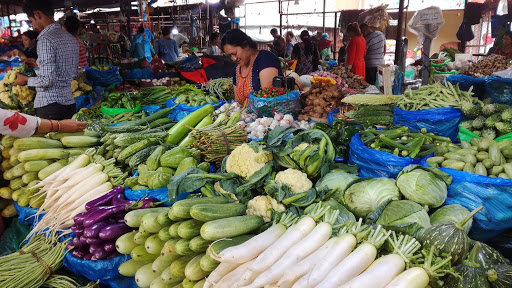Nepal has no technology to test alleged use of oxytocin in fruits and vegetables
Injina Panthi / April 30, 2019

Vegetables at the Kalimati Fruits and Vegetables Market, at Kalimati, Kathmandu. Photo: Injina Panthi
Reports about farmers using oxytocin hormone to boost the size of fruits and vegetables have been appearing on the social media from time to time. Such reports become viral instantly.
South Asia Check has attempted to find out about the alleged use of oxytocin in vegetables and fruits.
According to Ram Krishna Subedi, information officer at Plant Quarantine and Pesticides Management Center, Nepal does not have the technology to detect the use of the oxytocin hormone in vegetables and plants. Subedi further said injecting the hormone into plants would not be financially profitable as the hormone alone costs between Rs 100 and Rs 150 per vial and it would be a tedious job to inject the hormone in each and every plant.
Renowned fact-checking organization Snopes on January 26, 2018 had published a report on the alleged use of oxytocin by Indian farmers. According to the report, “Reports imply that Indian farmers are using oxytocin to boost the size of their fruits and vegetables. But it is unclear how widespread the practice may be.”
According to the Snopes’s report, most of the reports on the injection of the hormone into fruits and vegetables are related to the Indian government’s decision to crack down on the illegal use of oxytocin. But the primary focus of the Indian government was the dairy sector and not fruits and vegetables.
According to the report, there have not been reliable scientific studies on the use of oxytocin in vegetable and fruits, in both India and other countries.
This material is copyrighted but may be used for any purpose by giving due credit to southasiacheck.org.
Comments
Latest Stories
- In Public Interest Covid-19 cases are low, but that’s not an excuse to avoid vaccination
- In Public Interest What is BF.7, the sub-variant that has the world by its grip?
- In Public Interest Threat of a new Covid-19 wave looms large amid vaccine shortage in Nepal
- In Public Interest As cases decline, Covid-19 test centres in Kathmandu are desolate lot
- In Public Interest Dengue test fee disparity has patients wondering if they’re being cheated
- In Public Interest As dengue rages on, confusion galore about what it is and what its symptoms are. Here’s what you need to know
In Public Interest
 Covid-19 cases are low, but that’s not an excuse to avoid vaccination
The Pfizer-BioNTech bivalent vaccines authorised by the Nepal Government provide better protection a...
Read More
Covid-19 cases are low, but that’s not an excuse to avoid vaccination
The Pfizer-BioNTech bivalent vaccines authorised by the Nepal Government provide better protection a...
Read More
- What is BF.7, the sub-variant that has the world by its grip?
- Threat of a new Covid-19 wave looms large amid vaccine shortage in Nepal
- As cases decline, Covid-19 test centres in Kathmandu are desolate lot
- Dengue test fee disparity has patients wondering if they’re being cheated
- As dengue rages on, confusion galore about what it is and what its symptoms are. Here’s what you need to know